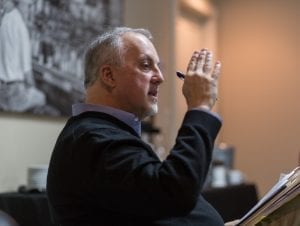This month, church boards will convene in the wake of the U.S. midterm elections (which, as we write, are still a day away). A congregation of any size has within it those who do not agree with one another socially, politically, theologically. What does belonging to one another in a church mean when the headlines of the day are serving to confirm, agitate, delight, and divide? How can you build community and nurture trust not only in your worship but in your board meeting?
On March 5, 1865, in the last weeks of the Civil War, Abraham Lincoln ended his second inaugural address with a paragraph focused on the challenge of future life together in a deeply broken and divided nation:
“With malice toward none, with charity for all, with firmness in the right as God gives us to see the right, let us strive on to finish the work we are in, to bind up the nation’s wounds, to care for him who shall have borne the battle and for his widow and his orphan, to do all which may achieve and cherish a just and lasting peace among ourselves and with all nations.”
What strikes you about how Lincoln chose to speak in that moment?
What surprises you most in Lincoln’s statement?
What do you think Lincoln means by “firmness in the right as God gives us to the see the right”–what kind of firmness is that?
What was Lincoln calling on citizens to do? Does it still speak to us today?
Lincoln spoke to the nation. The Apostle Paul, facing an equal measure of division in the church at Corinth, wrote to the first century church:
1 Corinthians 12:21-27:
21 The eye cannot say to the hand, “I have no need of you,” nor again the head to the feet, “I have no need of you.” 22 On the contrary, the members of the body that seem to be weaker are indispensable, 23 and those members of the body that we think less honorable we clothe with greater honor, and our less respectable members are treated with greater respect; 24 whereas our more respectable members do not need this. But God has so arranged the body, giving the greater honor to the inferior member, 25 that there may be no dissension within the body, but the members may have the same care for one another. 26 If one member suffers, all suffer together with it; if one member is honored, all rejoice together with it.
27 Now you are the body of Christ and individually members of it.
Why is unity so important for the church?
Why is it so hard to achieve?
What does it cost you – as a person, as a church board – to submit to Paul’s words that there be “no dissension within the body?”
What is your experience of suffering when all suffer?
Article Co-Written By:
 Elizabeth Lynn has founded two innovative programs, the Center for Civic Reflection and the Institute for Leadership and Service at Valparaiso University, both aimed at expanding moral imagination for civic leadership.
Elizabeth Lynn has founded two innovative programs, the Center for Civic Reflection and the Institute for Leadership and Service at Valparaiso University, both aimed at expanding moral imagination for civic leadership.
 Mark Ramsey, Executive Director of Macedonian Ministry, has served for more than 30 years as a parish pastor and chaired a lot of church board meetings.
Mark Ramsey, Executive Director of Macedonian Ministry, has served for more than 30 years as a parish pastor and chaired a lot of church board meetings.









No Comments